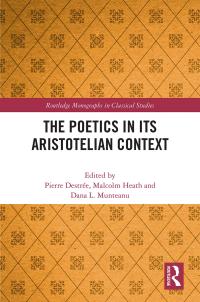Dana Munteanu

Contact Information
Associate Professor
Areas of Expertise
- Greek Drama
- Philosophy (Aristotle)
- Reception of classics
Research Statement
My research focuses on confluences between philosophy and literature in the field of classics and beyond. In my first book, Tragic Pathos, and several early articles, I have reexamined the mysterious nature of the emotional responses to tragedies, as described by ancient Greek philosophers (Gorgias, Plato, Aristotle) and as expressed within the plays themselves (Aeschylus, Sophocles, and Euripides). Currently, I am developing several projects: an examination of false death in tragedies, a book about ancient philosophers on stage, and a collaborative project on Aristotle’s Poetics in light of the philosopher’s broader interests (biology, political theory, and ethics).
Books


Recent articles
“Hamartia through Agnoia. An Embodiment of a Poetic Concept in Greco-Roman Antiquity,” in Brill’s Companion to the Reception of Aristotle’s Poetics, Christine Mauduit, Guillaume Navaud, and Olivier Renaut (eds.), (2024) Brill, 287-310.
“Women’s Voices in Euripides’ Tragedies,” in Brill Companion to Euripides, Andreas Markantonatos editor, volume 2 (2020) 887-908.
“Varieties of Characters: The Better, the Worse and the Like,” in The Poetics in Its Aristotelian Context, P. Destrée, M. Heath and D. Munteanu editors, London: Routledge (2020) 145-164.
“Poetic Fear-Related Affects and Society in Greco-Roman Antiquity,” in Affect (Critical Concepts, New Cambridge University Press Series), Alex Houen editor, Cambridge: CUP (2019) 33-48.
“Aristotle’s Reception of Aeschylus: Reserved without Malice,” in Brill’s Companion to the Reception of Aeschylus, Rebecca Kennedy editor, Leiden: Brill (2018) 87-108.

